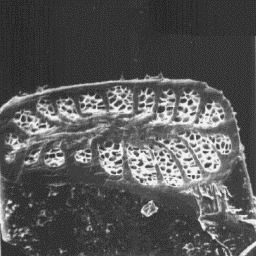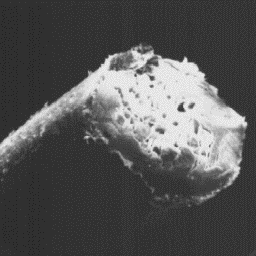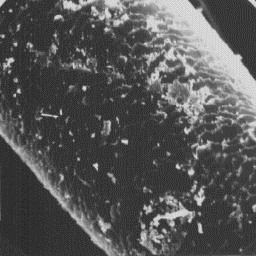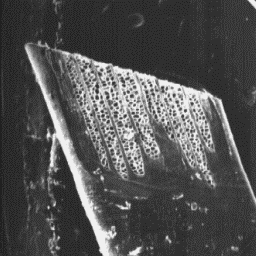 Dicotyles tajacu
Dicotyles tajacu
----------------
English: Collared peccary
German: Halsband-pekari
French: P‚kari a collier
Spanish: Mustela
Distribution areas
------------------
The collared peccary, and the similar
species Dicotyles albirostris, live in the
forests of all over South America up to
altitudes of about 1 000 m above sea level.
Description of the fur
---------------------- Transverse section
The skins are from 60 to 75 cm long. The of a guard hair, 1200x
basic coloration of the coat is black-brown,
but the sides are yellow-brown and the belly is brown in colour. Around the
neck and over the chest area the coloration is yellow-white. The hairs are
very coarse, black in the bottom part of the shaft and light and dark striped
along the length.
|
|
 Dicotyles tajacu
Dicotyles tajacu
----------------
English: Collared peccary
German: Halsband-pekari
French: P‚kari a collier
Spanish: Mustela
Structure of the hair
---------------------
The microscopic structure of the skin
surface is furrowed. The upper parts of the
hair follicles are narrow with raised edges
and contain only one hair shaft.
The fine fibres are from 150 to 300 µm
in diameter, so are fine only in a relative The cuticular structure
sense. The cross-section is circular and of an intermediate hair, 100x
the cuticular scales are often on
indistinctly-shaped type. The medulla is wide, unbroken and central
non-symmetrical-shaped. The structure of the medullar infilling substance is
of the complex-sheet-like type; the overall medullary pattern is of the
non-symmetrical non-uniform lattice type.
|
|
 Dicotyles tajacu
Dicotyles tajacu
----------------
English: Collared peccary
German: Halsband-pekari
French: P‚kari a collier
Spanish: Mustela
The intermediate fibres and guard hairs
are of the same structure, the difference
is only in the cross-sectional diameter.
These fibres are oval in cross-section with
a maximum diameter of 800 to 1 350 µm. The
cuticle is covered with crenated, tile-like
scales. The scale surface is smooth and
scale margins are rippled. The medullary
column is wide, longitudinally unbroken and Transverse section
of the non-central regular shape, belonging of an intermediate fibre, 200x
to the lattice type with sheet-like
infilling substance.
|
|
 Dicotyles tajacu
Dicotyles tajacu
----------------
English: Collared peccary
German: Halsband-pekari
French: P‚kari a collier
Spanish: Mustela
The cuticular structure
of a guard hair, 600x
|
|
 Dicotyles tajacu
Dicotyles tajacu
----------------
English: Collared peccary
German: Halsband-pekari
French: P‚kari a collier
Spanish: Mustela
Transverse section
of a guard hair, 60x
Numerical code for collared peccary skin structure
--------------------------------------------------
Surface of the skin: 3-5-1
Fine fur fibres: 1-16-0-2-2-1-2-10-4-150.301-15.35
Intermediate fibres: 2-4-1-2-2-1-3-8-14-800.1001-30.59
Guard hairs: 2-4-1-2-2-1-3-8-14-1000.135-40.69
|




